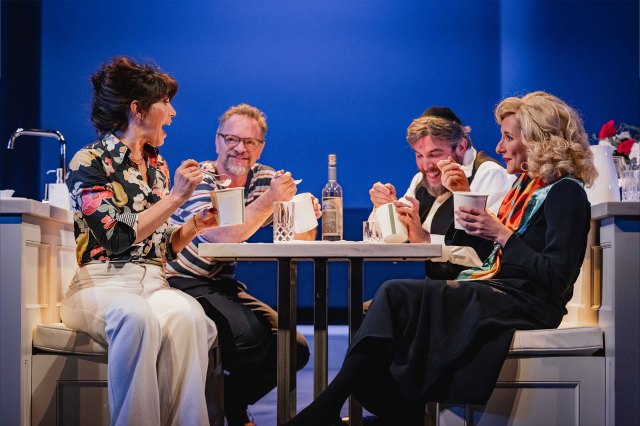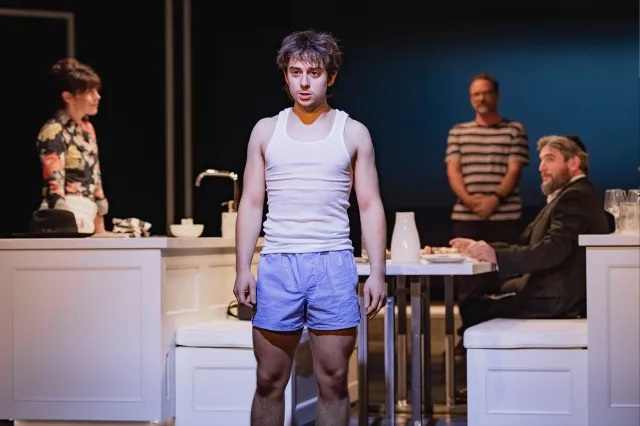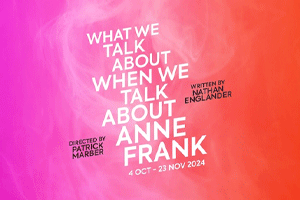What We Talk About When We Talk About Anne Frank at Marylebone Theatre – review
Patrick Marber’s production runs until 23 November

No other current London stage play engages with present-day global politics as much as this one. That Nathan Englander’s What We Talk About When We Talk About Anne Frank manages to feel so relevant, alive, and even-handed as it filters thorny themes and controversial viewpoints through the genre of comedy of manners, in this instance incredibly bad ones, is cause for celebration.
It’s testament to the quality of Patrick Marber’s punchy, intelligent production and a quintet of terrific performances that the piece hits hard but remains entertaining. If it sometimes lacks verbal finesse and thematic nuance, that’s probably because Englander has been rewriting up to the eleventh hour to reflect ongoing developments in the Israel-Palestine conflict that dominate news and social media as well as the conversations in this talky piece.
There are echoes of Yasmina Reza’s God of Carnage in the set-up of a pair of diametrically opposed couples thrashing out their differences as the booze flows, and equally of Josh Harmon’s Bad Jews as the boundaries of Judaism are challenged, history and collective trauma invoked, and the unsayable dragged out into the open. It’s on-the-nose stuff, if not as brutal or incendiary as a quick trawl through X or Threads is at present, with tensions running daily ever higher as the atrocities in the Middle East accumulate.
Liberal, moneyed American Jews Phil and Debbie (Joshua Malina and Caroline Catz) host Jerusalem-based Zionist Orthodox couple Shoshana and Yerucham (Dorothea Myer-Bennett and Simon Yadoo) in their Florida home. Debbie and Shoshana were best friends in their formative years as students, the latter nursing a grievance that she felt abandoned by the former when she fully embraced their religion.
The relationship dynamics convince. Malina’s Phil is sarcastic, incredulous, playful but with a sting, while Catz’s frequently hilarious Debbie, despite her opulent lifestyle, lives in a state of perpetual alarm and guilt. Shoshana and Yerucham are entrenched in traditional values but present more of a united, if uncompromising, front.
Yadoo unerringly captures Yerucham’s combination of bear-like sentimentality and hard-nosed ruthlessness. For all his bonhomie and humour, you don’t doubt for a moment that this is a man capable of cutting off his own child for marrying outside the faith. A riveting, watchful Myer-Bennett simultaneously and brilliantly conveys both the free spirit Shoshana used to be and the deeply religious woman she has become.
These people kvetch and opine a lot, but they know how to party: so much vodka is consumed, it’s a miracle the characters aren’t crawling around on their hands and knees by the end of the first act, and Debbie has her teenage son’s pot stash, so the argumentative quartet gets high as well as hammered. Mind-altering substance as revelation inducement is a hackneyed dramatic trope, but Englander’s writing is so potent it’s easy to roll with it here. The play examines what it means to be Jewish in the light of present-day events and across the broader canvas of history, but Englander doesn’t attempt to offer glib solutions. If the lasting overall impression is more impassioned mess than well-crafted drama, well, it still keenly resonates.

Englander has the American couple’s son Trevor (delightful Gabriel Howell, neatly side-stepping the privileged teenage stoner cliché that the character could easily slip into) as a sort of laconic Emcee, orchestrating the action, announcing the scene breaks and generally observing the older folks behaving like idiots. The sense of the younger generation being more preoccupied with cataclysmic environmental changes in the planet than the provenance of the Israeli state is persuasive, expressed in a rage-filled speech that might feel clumsily placed if Howell didn’t deliver it so compellingly.
The final scene provides genuine catharsis as the quartet plays a self-flagellating variant of Truth or Dare, each pretending in turn to be teenage Anne Frank asking to be hidden and saved from danger, the other three having to answer honestly whether or not they’ll help, and why. By this stage, we are so invested in the characters that it becomes edge-of-your-seat stuff. It’s hard to forget the look in Myer-Bennett’s Shoshana’s tear-filled eyes as she bargains with her husband for the right to reconnect with her lost child, or the way the couples, for all their wrangles, close ranks at perceived upsets and slights. There’s a strangely moving dance conclusion pitched halfway between dramatic cop-out and the suggestion of a communality of joy and pain amongst Jewish people.
Marber’s pacing and blistering handling of the dialogue occasionally feel hampered by Anna Fleischle’s awkwardly static kitchen set that renders sightlines problematic unless you’re sitting dead centre, but this is undeniably a troubling yet richly enjoyable night out. Given the events of the past year, there’s a nagging feeling that this is essentially entitled people screaming at each other, albeit very entertainingly, for a couple of hours while in the real world, the body count of the innocent gets ever higher. But it’s the sort of play you’ll be thinking and talking about after the final curtain, and theatre to provoke the conversations we need to be having right now.
















